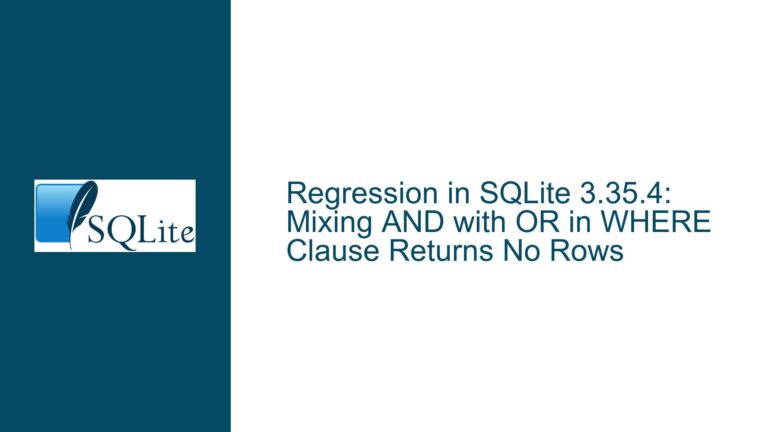Efficiently Querying ZIP Codes in SQLite Without Native Regex Support
Querying ZIP Codes with Prefix Matching in SQLite
When working with SQLite, a common requirement is to filter records based on partial matches of string data, such as ZIP codes. A typical use case involves retrieving all records where the ZIP code starts with specific digits. SQLite, however, does not natively support regular expressions (regex) out of the box, which complicates the task for developers accustomed to using regex for pattern matching. This limitation necessitates alternative approaches to achieve the desired results efficiently.
The core challenge lies in the fact that SQLite’s LIKE operator, while useful, can become cumbersome when dealing with multiple prefixes. For instance, if you need to match ZIP codes starting with "01", "04", or "54", you would typically write a query with multiple LIKE conditions. This approach, while functional, can be verbose and may not leverage SQLite’s indexing capabilities optimally, especially when dealing with large datasets.
Moreover, the absence of native regex support means that developers must either rely on external extensions or find creative ways to use SQLite’s built-in functions to achieve similar functionality. This situation often leads to questions about the most efficient and maintainable way to implement such queries, particularly when performance is a concern.
Interrupted Write Operations Leading to Index Corruption
One of the primary reasons developers seek alternatives to regex in SQLite is the potential performance overhead associated with using external regex functions or complex LIKE conditions. When dealing with large datasets, even small inefficiencies in query execution can lead to significant performance degradation. For example, using multiple LIKE conditions can result in full table scans, especially if the zip column is not indexed or if the query planner cannot utilize the index effectively.
Another consideration is the case sensitivity of the LIKE operator. By default, LIKE is case-insensitive, which can be problematic when dealing with numeric data like ZIP codes. Although ZIP codes are typically numeric, SQLite treats them as text, and thus, the case sensitivity setting can impact query performance. If an index exists on the zip column, it may not be used optimally unless the LIKE operator is explicitly configured to be case-sensitive.
Additionally, the use of functions like SUBSTR to extract the first two characters of the ZIP code can introduce performance bottlenecks. While this approach can simplify the query syntax, it may prevent the query planner from using existing indexes on the zip column. This is because SQLite’s query planner generally cannot use indexes on expressions or function results unless a specific expression index is created.
Implementing SUBSTR and Index Optimization for ZIP Code Queries
To address the challenges of querying ZIP codes in SQLite, several strategies can be employed, each with its own trade-offs in terms of complexity, performance, and maintainability. The most straightforward approach is to use the LIKE operator with multiple conditions. For example, to find all records where the ZIP code starts with "01", "04", or "54", you can write the query as follows:
SELECT COUNT(*) FROM MyTable WHERE zip LIKE '01%' OR zip LIKE '04%' OR zip LIKE '54%';
This query is simple and easy to understand, but it may not be the most efficient, especially if the zip column is indexed. The LIKE operator can use the index only if the pattern does not start with a wildcard character (e.g., %). In this case, since the pattern starts with specific digits, the index can be used, but the query planner may still need to evaluate each LIKE condition separately, leading to potential performance issues with large datasets.
An alternative approach is to use the SUBSTR function to extract the first two characters of the ZIP code and then use the IN operator to match against a list of prefixes. This approach can simplify the query syntax and make it more readable:
SELECT COUNT(*) FROM MyTable WHERE SUBSTR(zip, 1, 2) IN ('01', '04', '54');
However, as mentioned earlier, this approach may not leverage the index on the zip column effectively. To optimize this query, you can create an index on the expression SUBSTR(zip, 1, 2). This allows the query planner to use the index for the IN condition, potentially improving performance:
CREATE INDEX idx_zip_prefix ON MyTable (SUBSTR(zip, 1, 2));
With this index in place, the query planner can use it to quickly locate rows that match the specified prefixes, resulting in faster query execution. However, creating and maintaining expression indexes can introduce additional overhead, especially if the dataset is frequently updated.
Another option is to use the GLOB operator, which provides a more powerful pattern matching capability compared to LIKE. The GLOB operator is case-sensitive and supports Unix-style wildcards, making it suitable for matching ZIP code prefixes:
SELECT COUNT(*) FROM MyTable WHERE zip GLOB '01*' OR zip GLOB '04*' OR zip GLOB '54*';
While GLOB can be more efficient than LIKE in some cases, it also has limitations. For example, it does not support the same index optimizations as LIKE, and it may not be as intuitive for developers who are accustomed to SQL’s standard pattern matching syntax.
For developers who require the full power of regular expressions, SQLite allows the loading of external regex functions. One such implementation is the regexp function, which can be loaded as a user-defined function. This approach provides the flexibility of regex pattern matching but requires additional setup and may introduce performance overhead, especially with complex patterns or large datasets.
In conclusion, the choice of approach for querying ZIP codes in SQLite depends on several factors, including the size of the dataset, the frequency of updates, and the specific requirements of the application. For small to medium-sized datasets, using LIKE with multiple conditions or SUBSTR with an expression index may be sufficient. For larger datasets or more complex pattern matching requirements, loading an external regex function or using GLOB may be necessary. Regardless of the approach, it is essential to consider the impact on query performance and maintainability, and to test each solution thoroughly to ensure it meets the application’s needs.






